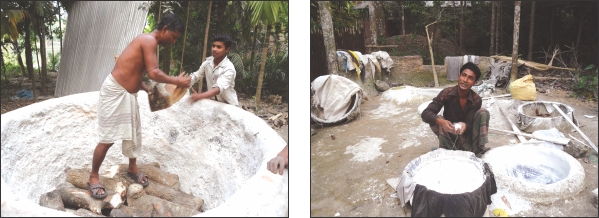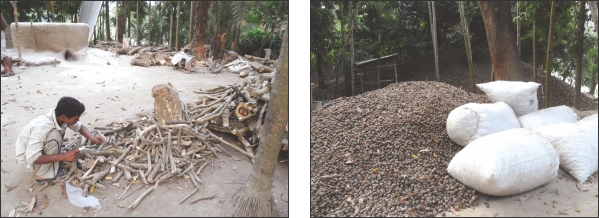COVER STORY

Lime from Snail-Shells
Snail shells are used to make lime that is used in betel leaf, shrimp culture and house paint and so on. More than 150 small and cottage industries around Narail now involves more than 500 people, who had no source of income before. The trade that came from their ancestors about 100 years ago has now changed the socio-economic status of the people in these areas. People involved in this cottage industry are now earning a decent living by selling shell lime.
..................................................................................................
Ponuel S Bose
The story of Kartick Das began 35 years ago when he was a 22 year old youth. He started a small business with an investment of taka 15,000. His business was producing lime from snail-shell.
Now he is an owner of a small cottage of lime industry and which produces about 5,000 maunds (measurement of weight) of lime in a year. He has about 15 paid permanent staffs, working on regular basis in his cottage industry.
“I first started this work with my father when I was only 13 years old, and I had no formal training. I started my own factory at the age of 22 with a mere investment of taka 15,000, but now the capital grown to taka 15 lakhs” said Kartick Das. “At first I sold my lime in different hat-bazar (village markets) of our district. Later, I decided to extend my business as a wholesale trader. I got good response and enjoyed good profit because the labour cost, fire wood, snail shell and others raw material costs were cheap. After that I never had to look back again.
There are others like Kartick Das who are involved in this cottage industry. It is a golden time for this small cottage industry. About 30 to 40 families of Gobra, Lakhipasha and Hamidpur village of Narail district are working in this unique industry with little or no assistance from the government.
They are making lime from snail-shell. The lime mainly is used in betel leaf, shrimp culture and house paint and so on. They are used all over Bangladesh.
The trade that came from their ancestors about 100 years ago and now has changed the socio-economic status of the people in these areas. People involved in this cottage industry are now passing golden period of time.

Lime of Narail has a great demand across the country including the capital city for its lower cost and high quality. They are in wholesale demand in Jhenaidah, Natore, Tangail, Magura, Manikganj, Rajshahi, Bogra, Rangpur, Chitagong, Comilla districts including capital city and there is enough opportunities to export to the neighbouring countries. However, government assistance is needed to tap its full export potential, Kartick suggested.
It was found that the villagers have established more than 150 small and cottage industries around these areas. More than 500 people who used to live a life of a beggar are now engaged in this industry.
Geeta Das (38), a trader of Gobra village has been selling limes in different district markets in the country including Dhaka for the last five years with profit. She said “I started this business after the death of my husband by investing only taka 20,000 and now my capital has grown to taka 2 lakhs”. She added that now she is able to meet all her family expenses with her income.
Poritosh Das of Gobra village said that during the last few years due to high price of materials and lack of sufficient capital as well as lower price of lime, they refrained from choosing this profession. Many of them were compelled to leave this profession at that time.
He added that Five years ago they used to collect snail-shell, oyster-shell from Sundarbans for their Lime industry but due to forest officers' extortion and pirate attacks, they stopped to collect materials from Sundarbans.
He further said that now the local 'Foria's (middle men) collect these snail-shells from different prawn dams. They buy the snail-shells at the rate of taka 200 per maund (40 kg = one maund). 'Foria's from Jessore, Faridpur and Narail, brings the snail-shells to the local small businesses for selling.
Another lime maker Aroti Rani (42) said due to increase of price and favourable market of shell-lime during the last one year the golden time of this industry has returned. They are getting good prices of lime in comparison with the production cost.
To produce lime, firstly they wash the shell of a snail. After cleaning it, the entire snail will be put in a Vata (furnace) which is set up with fire wood. Later, the snails are burnt and turned into slaked lime.
Slaked lime mixed with water is sold with betel leaf and nut.
There are two types of lime- dried powder lime and molding lime. They said that the dried powder lime sells at taka 800 per maund and molding lime sells at taka 500 hundred per maund.
Though picking up snails cause some environmental damage, it can be economically beneficial to Bangladesh if it is exported to foreign countries in refined form.
Kolpona Das (43) owner of a small lime factory said, “From the profit I earned from the snail-shell business, I bought 50 decimals of cultivable land with taka 1,20,000. I have been paying for the education of my child and also spent one lakh taka on my daughter's wedding.”
Badol (45) have been working in this industry for four years said, “I now earn taka 1400 in a week. Now I can maintain my family with over taka 3000 in a month.”
Kartick Das said that the favourable market condition of shell-lime is enabling them to earn more profit.

However, when they need extra financial help, they have to borrow money from different non-government organizations by paying 25 to 30 percent as interest and service charges.
“This is because they do not have an access to bank loans”, said Das. Most factory owners in the village of Gobra and adjacent villages in Narail are unaware of SME and other soft loans. Even the banking policies are not suited for this trade. Banks are also not very keen to give loans outside of the municipality.
On the other hand most businessmen and industry owners like to avoid bank loans because of the formalities and hassles.
“Not only that, not a single government official has yet come to the village to inquire about their problems in the last 30 years of the business”, said Das.
Kartick Das said that he produces 20 maunds of powder lime in a day. To make 20 maunds of lime, the furnace which can contain 30 maunds of snail-shells needs at least 40 maunds of fire wood. It costs a total of taka 8,000.
“We have the potential to export lime but we need industrial loans to purchase modern machinery and arrange training to produce quality items and maintain quality”, said Kartick.
He urges the government to support this industry so that lime can be exported to foreign countries, which can play a great role in our national economy.
Now one kg of lime costs from taka 20 to 22.
People involved in shell-lime industry calls upon the government to patronize the expansion of this industry.
More than 5,000 people are involved in making lime with no formal training. At least 1,50,000 lakh maunds of lime are being produced from these farms in a year.
They urge the government to develop road communication in the area and provide soft loans for this industry.
Cover Illustration by Ujjal Ghose
Copyright
(R) thedailystar.net 2012 |